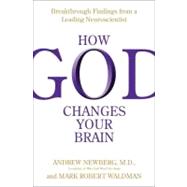
Note: Supplemental materials are not guaranteed with Rental or Used book purchases.
Purchase Benefits
What is included with this book?
| Author's Note | p. xi |
| Religion and The Human Brain | |
| Who Cares about God?: Prelude to a Neurological and Spiritual Revolution | p. 3 |
| Do You Even Need God When You Pray?: Meditation, Memory, and the Aging Brain | p. 22 |
| What Does God Do to Your Brain?: The Neural Varieties of Spiritual Practice | p. 41 |
| Neural Evolution and God | |
| What Does God Feel Like?: The Varieties of Spiritual Experience | p. 67 |
| What Does God Look Like?: Imagination, Creativity, and the Visual Representation of Spirituality | p. 83 |
| Does God Have a Heart?: Compassion, Mysticism, and the Spiritual Personalities of the Brain | p. 106 |
| What Happens When God Gets Mad?: Anger, Fear, and the Fundamentalist in Our Brain | p. 131 |
| Transforming Your Inner Reality | |
| Exercising Your Brain: Eight Ways to Enhance Your Physical, Mental, and Spiritual Health | p. 149 |
| Finding Serenity: Meditation, Intention, Relaxation, and Awareness | p. 170 |
| Compassionate Communication: Dialogue, Intimacy, and Conflict Transformation | p. 214 |
| Epilogue: Is God Real?: A Personal Reflection | p. 241 |
| Compassionate Communication: CDs, Workshops, and Online Research | p. 249 |
| How to Participate in Our Research Studies | p. 251 |
| Meditation and Mindfulness: Books, CDs, and Resources | p. 253 |
| Acknowledgments | p. 257 |
| Endnotes | p. 259 |
| Index | p. 335 |
| Table of Contents provided by Ingram. All Rights Reserved. |
The New copy of this book will include any supplemental materials advertised. Please check the title of the book to determine if it should include any access cards, study guides, lab manuals, CDs, etc.
The Used, Rental and eBook copies of this book are not guaranteed to include any supplemental materials. Typically, only the book itself is included. This is true even if the title states it includes any access cards, study guides, lab manuals, CDs, etc.
Excerpted from How God Changes Your Brain: Breakthrough Findings from a Leading Neuroscientist by Andrew Newberg, Mark Robert Waldman, Andrew B. Newberg
All rights reserved by the original copyright owners. Excerpts are provided for display purposes only and may not be reproduced, reprinted or distributed without the written permission of the publisher.